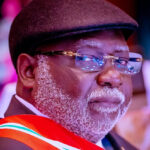
When my brother, Tunde Adejuyigbe, SAN, on behalf of the branch requested me to attend this event to lead this discussion, I had no hesitation in answering in the affirmative. Like Alao Aka Basorun, Tunde Adejuyigbe sets a remarkably high intellectual, professional and civic bar. He does not lend his name or time lightly to any undertaking. So, when he endorses or is involved in any undertaking, you can trust that it is serious.
Alao Aka Basorun (Aka), preceded me to the London School of Economics and Political Science (LSE) by over four decades, having graduated from there before his admission to Bar in England in 1955. In August 1989, on the opening day of the Nigerian Bar Association’s annual conference, I met Alao Aka Basorun on Adeola Hopewell Street as he walked from the Law School Auditorium back to the NBA Secretariat and he offered me a job. I did not eventually get to work from his office but he remained a source of personal and professional support, especially through my early years. As a law student, I lived near his office in Ebute Metta and admired his civic courage and plain speaking and he would become for me a source of professional inspiration. I do no injustice to the men and woman who have led the NBA over the over the 135 years of the Nigerian legal profession when I say that Alao Aka Basorun remains the greatest president our association has produced. I consider it a great privilege to participate in this lecture series in his memory in any capacity. It is a personal honour to be asked to lead it on such a timely topic at this time in Nigeria’s history.
It cannot be easy at this time to organize an event for the advancement of the idea of justice, accountability or orderly society anywhere in Nigeria. Wherever one turns, the country appears overrun by the triple blights of disorder, anarchy, and impunity. It is, therefore, essential to begin by conveying my personal delight and thanks to the Ikeja Bar for this event. We all owe a huge debt of thanks and gratitude to the leadership of the Ikeja Bar for departing from a national preoccupation with perverse incentives and instituting this lecture series in the memory of a man who set a high bar for us all as both citizens and professionals.
We have a duty as a profession to avoid the impression, not entirely excluded by the framing, experience, or public perception, of judicial and legal actors overly preoccupied with institutional navel gazing at the expense of public wellbeing. The reputation of Nigeria’s legal profession – including both the Bench and the Bar – is at an all-time low and that is being charitable. The public perception of a collection of expensively educated time wasters fiddling while the country burns is very widely held, and some could argue, well founded. The only people that appear to compete with the legal profession for the title of the worst in public imagination are politicians, election administrators, and law enforcement agents. Sex workers may even appear at this time, to be held in higher esteem.
It was not always so. Alao Aka Basorun was not just an epic president of the NBA, he was also the leader of the Campaign for Democracy (CD). In these roles he articulated very clearly the interface between the integrity of the legal and judicial systems on the one hand and the enterprise of democratic governance on the other, underscoring always the importance a judicial system that offered both credible access to citizens and meaningful exit to those who come in contact with it. Two decades after his passing, Nigeria is now saddled with a judicial system that manifestly lacks credibility, is inaccessible, and does not afford any meaningful exit to those who seek to use it.
The framing of the theme for this lecture clearly recognizes that Nigeria’s judicial system is ailing. That does not dispense with the need to undertake a diagnosis of what ails it and whether those ailments are curable with any remedies that may be fashioned in Nigeria.
The focus at this lecture on the integrity of the judicial and legal systems necessarily extends to the responsibilities not merely of judges but also of lawyers. Three important questions must be recognised before even getting to the question for discussion. The first issue is to clarify the extent to which the participants in this conversation are interested in an honest and objective examination of the issues involved. There is a tendency, when this kind of question is posed, for professional organizations to get insular and defensive, and seek to provide justifications for particular practices or positions that are frankly indefensible.
The second issue is whether as a collective, we are prepared to acknowledge the scale of the problem and its existential consequences for the vocation of the delivery of justice. If we cross these questions of disposition to honest and objective conversations on the theme, and of scale, the third question would be whether we are prepared to then diagnose our illnesses clinically enough in order to enable us to proceed to a search for solutions or prescriptions. A tendency to over-sentimentalise or parochialise responses to these questions is not entirely unknown to our professional communities.
I do not presume to suggest that any of these could be easy in a habitually disputatious group like the Bar. My brief here is not to seek unanimity or to encourage it. Rather it is to pose questions that should hopefully engage the attentions of the Bar as a collective. What we do with those questions would be entirely our decision. I would dare to suggest, however, that avoiding those questions at this time in particular, would be an invitation to vocational suicide. I pose these questions more as a citizen and court user than as a relapsed lawyer. The methodology is illustrative rather than prescriptive. My hope is that in illustrating some of the major issue areas, we can undertake a mutually enlightening process which also eschews unhelpful finger-pointing.
A Tale of Pillow-talk
It is fitting that this lecture focuses on the institutional integrity of the judiciary, a subject matter to which Aka devoted much personal and professional attention. This event also takes place in the week in which a retiring Senator utilized the cover of parliamentary privilege to disclose on the floor of the National Assembly that he had effectively got his wife, a former president of the Court of Appeal, to pervert the cause of justice for party political purposes. 48 hours after that disclosure, the National Judicial Council rose from its 102nd statutory meeting on Ameh Ejekownyilo, without appearing to take any definite steps about it. The President of the NBA, himself a member of the NJC, rose from the meeting to issue a statement in which he described the disclosures of the Senator as “rather disgusting and despicable”, while also taking liberty to inform the public that “the NJC condemned the actions of the Senator in the strongest of terms as an affront to the integrity and independence of the judiciary.”
If this all sounds very strange, it is because it is. First, the president of the NBA is not the spokesperson of the NJC. If the NJC condemns what the Senator is said to have done, then it is for the NJC to say so, not for the president of the NBA to become its ad-hoc spokesperson for that purpose. Second, the question must be asked: what does the NJC purport to condemn – the fact that the Senator took advantage of parliamentary privilege to override spousal privilege or the content of the claims that he disclosed. In respect of the former, the NJC cannot pierce the veil of parliamentary privilege without leave under an exception that must be disclosed. In respect of the latter, the NJC is not in a position to condemn conduct that it appears to have chosen not to investigate. The alleged condemnation by the NJC is either a deliberate deflection or entirely fictional. The likelihood is that the NJC would prefer for the affairs chez Bulkachuwa to simply vanish. Third, a judiciary that is unwilling to insist on an independent investigation in this situation cannot at the same time resort to the ostentatious notion of “the integrity and independence of the judiciary.” It has none to speak of and rather regrettably tarnishes the few good judges who nevertheless exist despite the challenges in the system.
To be continued tomorrow.













